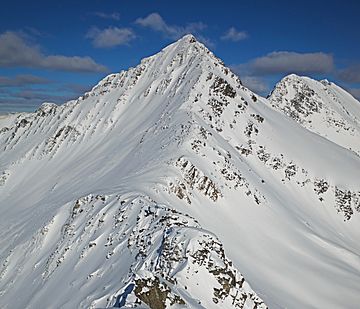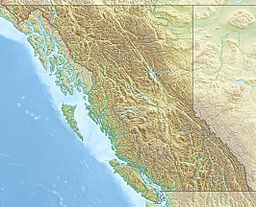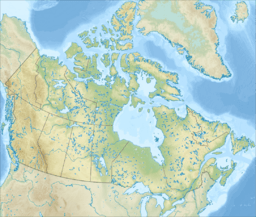Ursus Minor Mountain facts for kids
Quick facts for kids Ursus Minor Mountain |
|
|---|---|

Ursus Minor Mountain, southwest aspect
|
|
| Highest point | |
| Elevation | 2,749 m (9,019 ft) |
| Prominence | 230 m (750 ft) |
| Parent peak | Mount Sifton (2922 m) |
| Geography | |
| Location | Glacier National Park British Columbia, Canada |
| Parent range | Hermit Range Selkirk Mountains |
| Topo map | NTS 82N/5 |
| Climbing | |
| First ascent | 1907, Rupert W. Haggen, Edouard Feuz Jr. |
| Easiest route | class 3 Scrambling |
Ursus Minor Mountain is a tall mountain peak in Glacier National Park, British Columbia, Canada. It stands about 2,749-metre (9,019-foot) high. This mountain is part of the Hermit Range within the Selkirk Mountains.
You can find Ursus Minor Mountain about 56 km (35 mi) northeast of Revelstoke. It is also 44 km (27 mi) west of Golden. Other nearby peaks include Cheops Mountain and Grizzly Mountain.
Contents
Exploring Ursus Minor Mountain
Ursus Minor Mountain is a popular spot for adventurers. It is known for its beautiful views and challenging climbs. The easiest way to reach the top is by Scrambling, which is a mix of hiking and easy rock climbing.
First Climbers
The first people to climb Ursus Minor Mountain were Rupert W. Haggen and his guide, Edouard Feuz Jr. They reached the summit way back in 1907. This was a big achievement for them!
How the Mountain Got Its Name
The name "Ursus Minor Mountain" was officially chosen in 1906. It was re-approved in 1932 by the Geographical Names Board of Canada. The mountain got its name because it is close to a stream once called Bear Creek. This creek is now known as Connaught Creek.
The name also fits with other nearby places that have "bear" in their names. These include Ursus Major Mountain, Grizzly Mountain, Bruins Pass, and Balu Pass. "Ursus" is a Latin word that means "bear."
Weather and Nature
Ursus Minor Mountain has a subarctic climate. This means it has very cold and snowy winters. Summers are usually mild. Temperatures can drop below −20 °C, and with wind, it can feel even colder.
Water Flow
Snow and ice melting from the mountain create water runoff. There is also a small glacier on the north side of the mountain. This meltwater flows into streams that become part of the Illecillewaet River and Beaver River. These rivers are important parts of the local ecosystem.
 | Jessica Watkins |
 | Robert Henry Lawrence Jr. |
 | Mae Jemison |
 | Sian Proctor |
 | Guion Bluford |



